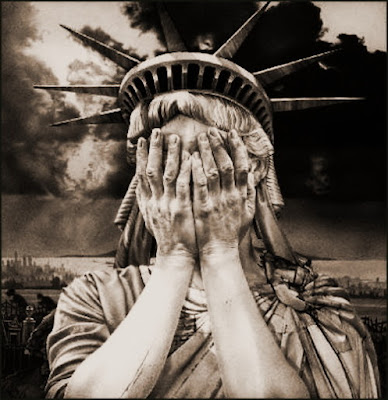With what he may have thought was a harmless and
indifferent gesture, US President Joe Biden this past week issued a powerful
message not only to Saudi Arabia but also to human rights advocates everywhere:
When it comes to the choice between defense of human rights, free speech and
democracy or cheap fuel for America’s gas-guzzling SUVs, we’ll take cheap gas.
 |
| Murdered journalist Jamal Khashoggi |
There can be little doubt that when Biden had to
confront the inevitable photo op with the ruthless Saudi leader, Crown Prince
Mohammed Bin Salman, it was an embarrassing moment. It looked way too much like what it was—humiliation,
desperation, the flailing of a drowning man.
After all, this was the guy
whom Biden had promised in fiery campaign speeches a couple of years ago that
he was going to hold to account and shun as “the pariah that he is.” But with Putin’s war in Ukraine turning the
oil market head over heels, and soaring gasoline prices at home fueling nearly
double-digit inflation and inversely scuttling the president’s popularity
ratings on all fronts, the question Biden probably asked himself was, as the
BBC’s veteran worldwide correspondent John Simpson quipped, “Who has a lot of
oil? Exactly!”
While the president would share a warm handshake
with Saudi King Salman bin Abdul-Aziz, he made sure that it was clear that MBS
only merited a quick fist-bump. One wonders if this was supposed to allay the concerns
of the liberals who had voted for him or to have prompted the international
community and human rights activists to say, “Ha, see there, fist-bump. I guess
Biden showed him!” Because if that was supposed to be the message, it didn’t
take. The word that more likely seems to have been the first to come to mind
was “capitulation” rather than scorn.
 |
| The politically costly fist-bump |
In the lead-up to this unfortunate meeting, Biden’s
West Wing had indicated he might not meet at all with MBS and would instead
only officially meet with the king. But too many foreign affairs experts made
it clear that if that was the plan, he might as well stay home, because the
cock who currently rules the roost in Saudi Arabia is the crown prince. The
king, they pointed out, is a mere figurehead for life, with no real power to
decide anything. If you want to talk to the Saudis, you can’t avoid talking to
MBS, because Saudi Arabia is a one-man show.
Which is precisely the point about the murder of
Saudi Washington Post columnist Jamal
Ahmad Khashoggi. Nothing of consequence happens in the Saudi regime without the
knowledge and complicity of MBS. To believe the official story of the Saudi
government that the murder was committed by rogue outliers without the crown
prince’s knowledge is to believe in fairytales—especially since the grisly
assassination took place within the premises of a Saudi diplomatic mission.
For anyone who might need to refresh their memory
regarding this major international incident, here’s a brief summary of the
facts. Jamal Khashoggi was a high-profile Saudi dissident, journalist and
author, who had long campaigned against the bloody regime, not as a radical,
but as a moderate who was willing to advocate gradual democratic improvement
without pushing for the overthrow of the Saudi government. Prior to his work as
a columnist for the Washington Post’s
Middle East Eye section, Khashoggi had served briefly as the editor of Al Watan, a Saudi newspaper that he sought
to mold into a platform for progressives seeking respect for human rights and a
more democratic opening. He was a particularly strong advocate of equal rights
for women in his country. But his trenchant opposition to the regime’s domestic
policies caused him to be sacked.
 |
| No fist-bump for the Saudi king. |
After the Saudi regime banned him from Twitter in
2017 for his criticism of the brutal policies supported by the king and crown
prince, Khashoggi had reason to believe that his life was in danger and in September
of that year, he left Saudi Arabia for self-imposed exile in the US. While in
exile, besides working for the Washington
Post, he also became general manager and editor-in-chief at the Al-Arab
News Channel, and continued to be a powerful voice for democratic change in his
native country.
He was, additionally, a staunch critic of the war on
Yemen waged by Saudi Arabia with US backing, which had fostered one of the
world’s worst humanitarian crises. Of that war, he once wrote: “The longer this
cruel war lasts in Yemen, the more permanent the damage will be. The people of
Yemen will be busy fighting poverty, cholera and water scarcity and
rebuilding their country. The crown prince must bring an end to the violence…Saudi
Arabia's crown prince must restore dignity to his country by ending Yemen's
cruel war.”
On October 2, 2018, the fifty-nine-year-old
journalist was happily planning his upcoming marriage to then
thirty-six-year-old Hatice Cengiz of Turkey. On that date, Khashoggi went to
the Saudi Embassy in Istanbul to request some documentation he would need for
his marriage. CCTV footage recorded him entering the embassy, but he was never
recorded coming out. Later investigation revealed that the journalist had been brutally
murdered inside the premises of the diplomatic mission and his body dismembered
and removed to another location.
After releasing a series of thin and conflicting
stories to try to cover up the heinous crime, the Saudi government eventually
admitted that the murder had occurred but has maintained ever since that it was
carried out without the crown prince’s involvement or knowledge. This, despite
the fact that in 2017, MBS had told another Saudi journalist that Khashoggi's
work was tarnishing his image, and that he would go after Khashoggi “with
a bullet.”
Less than two months before his murder, Khashoggi
wrote, “Saudi Arabia's Crown Prince…is signaling that any open opposition to
Saudi domestic policies...is intolerable." As an example of this
repressive policy, he pointed to government measures “…as egregious as the
punitive arrests of reform-seeking Saudi women.” He wrote that “while MBS is
right to free Saudi Arabia from ultra-conservative religious forces, he is
wrong to advance a new radicalism that, while seemingly more liberal and
appealing to the West, is just as intolerant of dissent.” Khashoggi went
on to write: “MBS's rash actions are deepening tensions and undermining the
security of the Gulf States and the region as a whole.”
Following careful investigation, the CIA has concluded
that there is no doubt that Khashoggi’s assassination was on orders from MBS
and that the crown prince had reached across international borders to carry it
out, sending a hit squad of more than a dozen agents to murder the journalist in
Turkey and make his body disappear. This is consistent with the fact that no
few of the regime’s other opponents have simply disappeared without a trace.
Despite President Biden’s initial promises to hold
MBS and Saudi Arabia to account for the murder and for the generally ruthless
policies of the regime, and in spite of repeated calls from human rights
advocates and liberal politicians for the severing of diplomatic ties with the
Saudi regime, this past week’s meeting with the crown prince rendered his good
intentions moot. Furthermore, that single meeting overshadowed Biden’s entire
Middle East tour, eclipsing everything else, which, even without the MBS
factor, didn’t go well.
To wit, besides fist-bumping his way into one of the
still most burning human rights controversies of today, sparking the outrage of
every human rights group at home and abroad that was looking to this
administration to restore the basic decency unceremoniously trashed during the
Trump presidency, he failed to get anything significant in return. There is no
real evidence to suggest that Saudi Arabia has the installed capacity to
significantly increase its production, or that, like the rest of the
international oil cartel, it would be willing to do anything that might spark a
drastic decrease in the price of oil. And the trip rendered no immediate
solution to high fuel prices in the rest of the region either.
While Biden managed to give the appearance of
inching bitter enemies Saudi Arabia and Israel somewhat closer together, there’s
no reason to believe that MBS will risk major conservative opposition at home
to appease Washington and Tel Aviv, nor is there any guarantee that the
right-wing Netanyahu camp won’t return to power in Israel and undo any progress
made. Furthermore, while he did his best to appear tough on Iran, he
simultaneously said that his administration still believed that diplomacy was
the answer and made clear his commitment to piecing the Iran nuclear accord
achieved under the Obama administration back together. While that was sure to
please those of us who believe that the way to deal with Iran is by bringing it
back into the concert of nations, it is a policy that is unlikely to garner any
support whatsoever after the mid-term elections when Democrats may very well
lose their tenuous hold on Congress.
To add insult to injury, while he was touring the
Middle East, Biden was once again blindsided by West Virginia senator and Democratic
outlier Joe Manchin, who again threw the president’s domestic policy plans into
utter chaos.
So what could the US president possibly have to gain
from capitulating to MBS? The answer is “nothing,” and his advisers should have
made him aware of that fact. Because by fist-bumping with a ruthless murderer,
the only thing the president has earned is the contempt of the international
human rights community and the further erosion of his support among liberal
Democrats.





